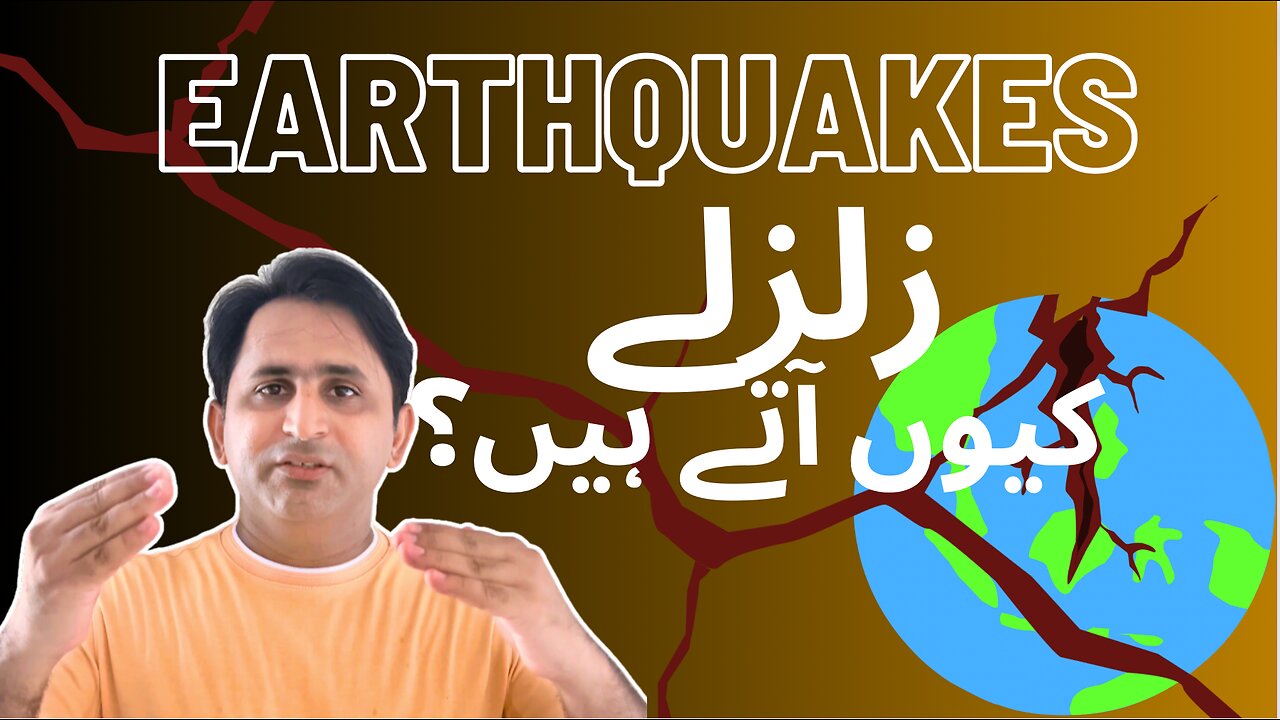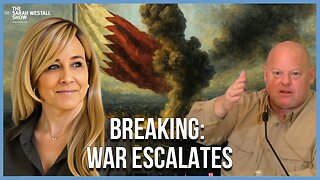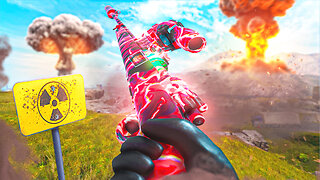Premium Only Content

Why do earthquakes happen? Causes of earthquakesزلزلے کیوں آتے ہیں؟ , Zalzaly Kyon aaty hain ?
Why do earthquakes happen? Causes of earthquakesزلزلے کیوں آتے ہیں؟ , Zalzaly Kyon aaty hain ?
Earthquakes occur due to the sudden release of energy in the Earth's crust, resulting in the shaking or trembling of the ground. This release of energy is typically caused by the movement of tectonic plates, which make up the Earth's outer shell. Here's a more detailed explanation of why earthquakes happen:
Tectonic Plate Movement: The Earth's outer shell is divided into several large and small pieces called tectonic plates. These plates are not fixed but are constantly moving very slowly. They can move away from each other (divergent boundary), move toward each other (convergent boundary), or slide past each other (transform boundary). It's the interaction at plate boundaries that often leads to earthquakes.
Plate Boundary Interactions:
Convergent Boundaries: When two tectonic plates collide, one plate may be forced beneath the other in a process called subduction. The intense pressure and friction at the subduction zone can cause rocks to deform and build up stress. When this stress is released suddenly, it generates seismic waves, causing an earthquake.
Divergent Boundaries: At divergent boundaries, tectonic plates move apart. As they separate, magma from the Earth's mantle can rise to fill the gap, creating new crust. The movement of the plates and the formation of new crust can lead to fractures and faults in the Earth's crust, which can cause earthquakes when stress is released.
Faults: Faults are fractures in the Earth's crust where rocks on either side have moved relative to each other. The sudden movement along a fault can cause an earthquake. The point on the fault where the rocks first break is called the focus or hypocenter, while the point directly above it on the Earth's surface is called the epicenter.
Human-Induced Earthquakes: In addition to natural causes, human activities such as mining, reservoir-induced seismicity (due to large dams), hydraulic fracturing (fracking), and the injection or extraction of fluids from the Earth's crust can also induce earthquakes.
1. What is an earthquake?
An earthquake is the shaking or trembling of the Earth's surface caused by the sudden release of energy in the Earth's crust.
2. What causes earthquakes?
Earthquakes are primarily caused by the movement of tectonic plates along plate boundaries. Stress builds up in the Earth's crust, and when it's released, it results in an earthquake.
3. What is the epicenter of an earthquake?
The epicenter is the point on the Earth's surface directly above the earthquake's point of origin or focus (hypocenter) in the Earth's crust.
4. How are earthquakes measured?
Earthquakes are measured using seismometers, and their magnitude is quantified on the Richter scale or the moment magnitude scale (Mw).
5. What is the Richter scale?
The Richter scale is a logarithmic scale that measures the magnitude of an earthquake. Each whole number increase on the scale represents a tenfold increase in amplitude of seismic waves and approximately 31.6 times more energy release.
6. What is the difference between an aftershock and a foreshock?
A foreshock is a smaller earthquake that precedes a larger main shock in the same area. An aftershock is a smaller earthquake that occurs after the main shock, often in the same region.
7. How can earthquakes cause tsunamis?
Earthquakes that occur under the ocean floor can displace large volumes of water, generating tsunami waves. The sudden upward or downward movement of the seafloor can push water upwards and trigger a tsunami.
8. Can earthquakes be predicted?
Currently, earthquakes cannot be predicted with precision. Scientists can identify areas at higher risk based on historical data and fault activity, but specific timing and magnitude predictions remain challenging.
9. What should I do during an earthquake?
If indoors, "Drop, Cover, and Hold On" is a recommended action. Drop to the ground, take cover under a sturdy piece of furniture, and hold on until the shaking stops. If outdoors, move away from buildings, streetlights, and utility wires.
10. How can I prepare for earthquakes?
- Preparedness includes creating an emergency kit, securing heavy objects, having an emergency plan for your family, and being informed about earthquake safety measures in your area. Additionally, consider retrofitting your home to withstand seismic activity.
11. Where are earthquake-prone regions in the world?
- Earthquake-prone regions are often located near tectonic plate boundaries, such as the "Ring of Fire" around the Pacific Ocean, the San Andreas Fault in California, and the Himalayan region.
12. What is liquefaction during an earthquake?
- Liquefaction occurs when water-saturated soil temporarily loses its strength during an earthquake, causing it to behave like a liquid. This can lead to the sinking or tilting of buildings and structures.
-
 1:02:26
1:02:26
The Nick DiPaolo Show Channel
11 hours agoPOC Murders Another White Woman | The Nick Di Paolo Show #1790
54.2K63 -
 2:04:29
2:04:29
Inverted World Live
7 hours agoNew UFO Hearing Testimony: Lockheed Martin Has Alien Technology | Ep. 105
65.3K8 -
 LIVE
LIVE
Akademiks
4 hours agoYNW Melly MIGHT BE COOKED! Co-D TELLLING? 6ix9ine vs Young Thug . Drake vs Kaicenat? HOLLY
1,169 watching -
 4:46:45
4:46:45
Drew Hernandez
11 hours agoHORRIFYING: FULL FOOTAGE OF IRYNA ZARUTSKA MURDER HAS BEEN RELEASED
30.9K25 -
 2:42:09
2:42:09
TimcastIRL
6 hours agoNATO Scramble Air Force Over Russian Incursion Into Poland, HIGH ALERT Reported | Timcast IRL
178K99 -
 25:46
25:46
Man in America
10 hours agoALERT: Gold Prices FLASH OMINOUS WARNING for the Dollar—Are You READY??
34.8K17 -
 58:27
58:27
Sarah Westall
6 hours agoWar Exploding Around the World: Nepal, Israel, Qatar, Venezuela, Thailand, more... w/ Michael Yon
41K13 -
 LIVE
LIVE
SpartakusLIVE
8 hours agoThe Most INSANE Snipes EVER || Solo to Duos w/ StevieT - PUBG or Mordor Later?!
413 watching -
 1:11:40
1:11:40
Flyover Conservatives
17 hours agoThe Truth About Israel & End Times Nobody Wants to Say - Phil Hotsenpiller | FOC Show
37.9K11 -
 LIVE
LIVE
GritsGG
5 hours agoSweaty Ranked Grind! Most Wins in WORLD! 3600+!
202 watching